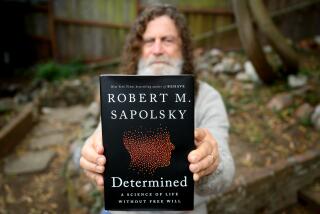BOOK REVIEW : Tantalizing Questions Trigger Thoughts on Brain and Mind
- Share via
The Remembered Present: A Biological Theory of Consciousness by Gerald M. Edelman (Basic Books: $29.95; 346 pp).
Compared to biology, physics is child’s play. And the most difficult questions in biology center on the brain and its manifestation, the mind.
Having just finished reading “The Remembered Present” by Gerald M. Edelman, I feel my brain spinning, which is as it should be, because Edelman’s topic is how the brain works, how flesh and blood give rise to thought, to consciousness and to wondering about such things.
Too much wondering about this topic is not good for you. After wrestling with this book, I am, in Hamlet’s words, “sicklied o’er with the pale cast of thought.”
But the more I read the more I am convinced that this is the ultimate question. Edelman, a Nobel laureate, has written three books, of which this is the third, attempting to work out a theory of thought. His conclusion is this:
“Consciousness may be seen as the haughty and restless second cousin of morphology (brain structure). Memory is its mistress, perception its somewhat abused wife, logic its housekeeper, and language its poorly paid secretary.”
That’s it? That’s it. Everything is in the structure of the brain. (Not that Edelman is the first person to say that.) But “consciousness is the key function of human brains.” It is also the part that cannot be duplicated by computers, which is one reason computers can’t think.
The trouble is that in physics or cosmology or most areas of scientific inquiry, “knowledge of this mental apparatus is unnecessary and irrelevant,” Edelman says.
But when studying the brain and the mind, the mental apparatus is everything. It is the studier and the object of the study. What’s more, the difference between brain and mind is the difference between science and philosophy. Where is the intersection between neurosurgery and psychiatry? Can one be explained without the other?
Getting a handle on this topic requires holding together the parts and the whole, the details and the big picture. In some sense, a scientific explanation of the brain seems beyond achievement. Molecules, bound by the laws of chemistry and physics, somehow produce novelty, a continual, seamless experience in which past, present and future blend into the richness of our inner lives.
To tell the truth, nobody really knows how this happens, but each of us experiences it in every waking moment, and, except when confronted with books like this one, we hardly give it a thought.
Edelman’s book is by turns lucid and opaque, which helps explain why he has been hailed and dismissed. I tend to the opaque judgment, but I don’t want to dismiss him. There’s an awful lot going on there. I wish I knew what it was.
Edelman posits two kinds of consciousness: primary consciousness, which is experienced by babies and, it seems, at least some animals, and second-order consciousness, which is the kind that is aware of and wonders about itself. These two levels of consciousness arise in different parts of the brain, he says, and result from different needs and interactions among the brain’s parts.
Brain cells work together in groups, which are unique to each individual. The groups are constantly changing and forming and unforming connections with other groups as needed. The whole system is in constant, dynamic flux, which accounts for the novelty we experience.
The book is nothing if not ambitious. There is philosophy (Galileo, Descartes, William James, Alfred North Whitehead, Karl Popper, Willard V.O. Quine), psychology (James again, Sigmund Freud and a gaggle of lesser lights), and scholars of language, learning, perception and memory. There is experimental data and high-level theory. And that’s not the half of it.
But despite Edelman’s obvious erudition and his best efforts to make sense of it all, I still don’t know where consciousness comes from. I have no doubt that every thought, every feeling, every nuance, every half-remembered memory mirrors a specific physical state somewhere in my head. But how that all happens is anybody’s guess, and how I come to think about how all that happens is still a complete mystery.
Wednesday: Jonathan Kirsch reviews “A Law Unto Itself: Power, Politics and the IRS” by David Burnham (Random House).






